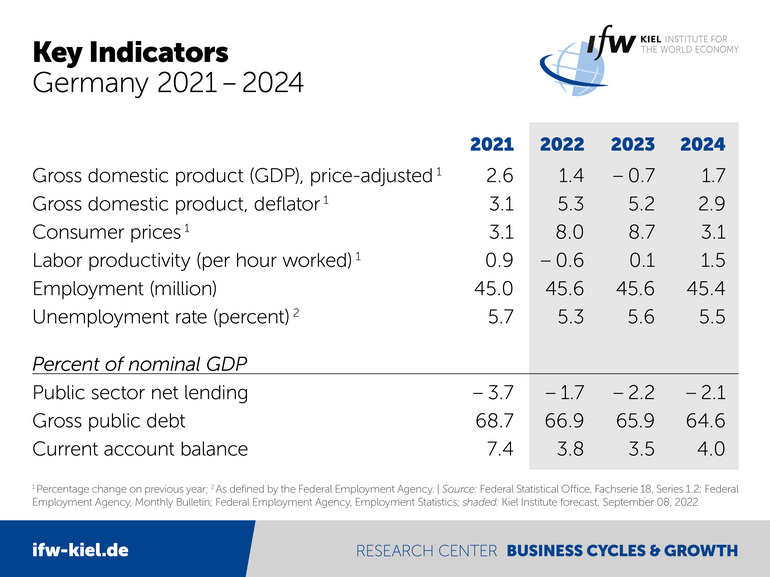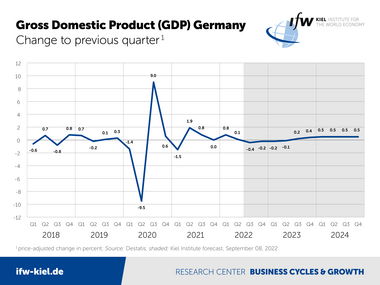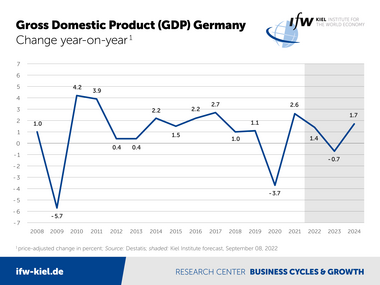News
Autumn forecast: High energy prices push German economy into recession

”With the high import prices for energy, an economic avalanche is rolling towards Germany. Energy-intensive production and consumption-related sectors of the economy in particular are being hit with force,” comments Stefan Kooths, Vice President and Head of Economic Forecasting at the Kiel Institute, on the most recent economic outlook for Germany, Europe, and the World Economy.
Germany's energy import bill is expected to rise by 123 billion euros this year and by another 136 billion euros next year. This money is missing domestically for consumption and reduces the profitability of energy-intensive companies. As a result, Germany's economic output will be 130 billion euros lower next year than previously expected. The purchasing power of private households is expected to fall by 4.1 percent next year, the sharpest drop ever seen in reunified Germany.
”The energy crisis is throwing a spanner in the works of what would otherwise have been a strong post-pandemic recovery. Expensive energy imports mean that Germany now has to transfer a much larger share of its earned income abroad than before. This makes Germany poorer overall. With its relief packages, the government can therefore only redistribute the burdens, it cannot eliminate them,” says Kooths.
Gross domestic product (GDP) is now expected to decline until well into next year and only turn slightly positive again in the third quarter of 2023. For 2024, the Kiel Institute expects GDP to grow by 1.7 percent.


Inflation in Germany is likely to increase further because the high energy prices are only gradually being reflected in end consumer tariffs and also in goods and services. The inflation rate is expected to be 8 percent in the current year and 8.7 percent next year. It is not until 2024 that price pressure is expected to ease more significantly and the rate will be 3.1 percent.
Real disposable incomes are falling more sharply than ever before in reunified Germany and are expected to decline by 4.1 percent in 2023, following a minus of 0.4 percent in the current year. They had already fallen by 0.9 percent in 2021. They are not expected to rise again until 2024.
Following an increase of around 4 percent in the current year, private consumption is expected to fall by 2.1 percent in 2023. Apart from the pandemic year 2020, this would be the sharpest decline in private consumption in reunified Germany. According to the forecast, private consumption will increase again slightly in 2024.
The recession, but also the minimum wage increase to 12 euros, mean that employment growth is likely to lose further momentum in the coming months. Next year, employment will peak at 45.6 million due to demographic factors. From then on, more people will leave the labor market than enter it. The unemployment rate isexpected to rise from 5.3 percent (2022) to 5.6 percent (2023) and then fall slightly to 5.5 percent (2024).
Debt brake: sticking to it possible in 2023, more difficult in 2024
Despite substantial additional spending to cushion the impact of high energy prices, the public sector net lending is unlikely to deteriorate much, as the high price buoyancy is also generating high tax revenues. It will rise from 1.7 percent in the current year to just over 2 percent in the next two years. The federal government can draw on high reserves and, for example, the latest relief package will only impose an additional burden in the lower double-digit billions.
This means that next year's budget will probably comply with the debt brake. In 2024, however, when under its rules the possibility of net borrowing is severely restricted by the upturn, compliance is likely to become more difficult.
Gross public debt as a share of nominal GDP is actually expected to decline, from 68.7 percent in 2021 to 64.6 percent in 2024, as nominal GDP is inflated due to overall high inflation.
”Even if the latest package of measures lacks precision, it is fundamentally right to help low-income households. But putting together more and more new aid packages is no substitute for a strategicrealignment of energy policy. The German government must now quickly clarify the long-term energy supply. This will determine which energy price increases are permanent and which are temporary. And only the latter should be smoothed out in terms of fiscal policy,” says Kooths.
Euro area drifts into recession, world economy clearly clouded over
The euro area isalso drifting into recession with negative growth in the current and coming quarters. Annual GDP is expected to rise by 2.8 percent in 2022 and almost stagnate in 2023, then increase moderately by 1.6 percent in 2024.
Euro area inflation is expected to rise to 8.1 percent in the current year, the highest rate since the start of the monetary union. In 2023, the inflation rate will probably fall only slightly to 7.2 percent and will moderate more substantially only in 2024, with the expected gradual decline in energy prices.
The outlook for the world economy has also deteriorated significantly, with the world economy expected to grow by only 2.9 percent this year and 2.2 percent next year. One reason is also that China's economy is weakening due to its strict zero-covid policy and problems in the real estate sector.

